
Matthew White Ridley, 5th Viscount Ridley, is a British journalist and businessman. He is best known for his writings on science, the environment, and economics. He has written several science books, including The Red Queen: Sex and the Evolution of Human Nature (1994), Genome (1999), The Rational Optimist: How Prosperity Evolves (2010) and The Evolution of Everything: How Ideas Emerge (2015). He publishes a blog and has been a regular contributor to The Times newspaper.
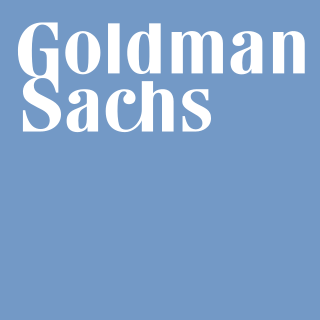
The Goldman Sachs Group, Inc., is an American multinational investment bank and financial services company headquartered in New York City. It offers services in investment management, securities, asset management, prime brokerage, and securities underwriting.

Jeffrey David Sachs is an American economist, liberal, academic, public policy analyst and former director of The Earth Institute at Columbia University, where he holds the title of University Professor. He is known as one of the world's leading experts on economic development and the fight against poverty.

The Road to Serfdom is a book written between 1940 and 1943 by Austrian-British economist and philosopher Friedrich Hayek. Since its publication in 1944, The Road to Serfdom has been an influential and popular exposition of market libertarianism. It has been translated into more than 20 languages and sold over two million copies. The book has also made a significant impact on twentieth-century conservative and libertarian economic and political discourse, and is often cited today by commentators.
A poverty trap is a self-reinforcing mechanism which causes poverty to persist. If it persists from generation to generation, the effect can reinforce itself as a "cycle of poverty", if steps are not taken to break the trap.
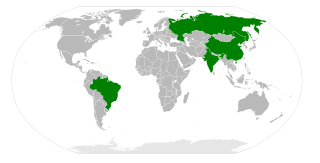
BRIC is a grouping acronym referring to the countries of Brazil, Russia, India and China, deemed to be developing countries at a similar stage of newly advanced economic development, on their way to becoming developed countries. It is typically rendered as "the BRICs" or "the BRIC countries" or "the BRIC economies" or alternatively as the "Big Four". A related acronym, BRICS, adds South Africa. Indonesia is sometimes suggested to be included on the basis that it is in a similar situation.

Peter Richard Grenville Layard, Baron Layard FBA is a British labour economist, currently working as programme director of the Centre for Economic Performance at the London School of Economics.

Michael Monroe Lewis is an American author and financial journalist. He has also been a contributing editor to Vanity Fair since 2009, writing mostly on business, finance, and economics. He is known for his non-fiction work, particularly his coverage of financial crises and behavioral finance.

The University of Brescia is an Italian public research university located in Brescia, Italy. It was founded in 1982 and is branched in 4 Faculties.

William Russell Easterly is an American economist, specializing in economic development. He is a Professor of Economics at New York University, joint with Africa House, and Co-Director of NYU’s Development Research Institute. He is a Research Associate of NBER, senior fellow at the Bureau for Research and Economic Analysis of Development (BREAD) of Duke University, and a nonresident senior fellow at the Brookings Institution in Washington DC. Easterly is an associate editor of the Journal of Economic Growth.
The Box: How the Shipping Container Made the World Smaller and the World Economy Bigger is a non-fiction book by Marc Levinson charting the historic rise of the intermodal container and how it changed the economic landscape of the global economy. The New York Times called it "a smart, engaging book".
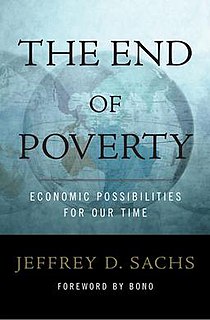
The End of Poverty: Economic Possibilities for Our Time (ISBN 1-59420-045-9) is a 2005 book by American economist Jeffrey Sachs. It was a New York Times bestseller.
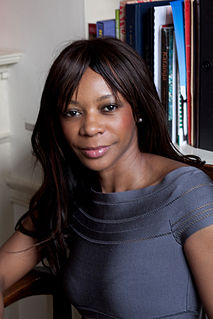
Dambisa Felicia Moyo is a Zambian economist and author who analyzes the macroeconomy and global affairs. She currently serves on the boards of Chevron Corporation and the 3M Company. She worked for two years at the World Bank and eight years at Goldman Sachs before becoming an author and international public speaker. She has written four New York Times bestselling books: Dead Aid: Why Aid Is Not Working and How There Is a Better Way for Africa (2009), How the West Was Lost: Fifty Years of Economic Folly – And the Stark Choices that Lie Ahead (2011), Winner Take All: China's Race for Resources and What It Means for the World (2012), and the most recent Edge of Chaos: Why Democracy Is Failing to Deliver Economic Growth – and How to Fix It (2018). She holds a bachelor's degree in chemistry and an MBA from American University, an MPA from the Harvard Kennedy School, and a DPhil in economics from the University of Oxford.

Terence James O'Neill, Baron O'Neill of Gatley is a British economist best known for coining BRICs, the acronym that stands for Brazil, Russia, India, and China—the four rapidly developing countries that have come to symbolise the shift in global economic power away from the developed G7 economies. He is also a former chairman of Goldman Sachs Asset Management and former Conservative government minister. As of January 2014, he is an Honorary Professor of Economics at the University of Manchester. He was appointed Commercial Secretary to the Treasury in the Second Cameron Ministry, a position he held until his resignation on 23 September 2016. Since 2008, he has written monthly columns for international media organization Project Syndicate.
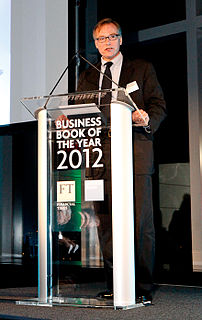
Financial Times and McKinsey Business Book of the Year Award is an annual award given to the best business book of the year as determined by the Financial Times and McKinsey & Company. It aims to find the book that has 'the most compelling and enjoyable insight into modern business issues'. The award was established in 2005 and is worth £30,000. Beginning in 2010, five short-listed authors each receive £10,000, previously it was £5,000.

Steven George Mandis is an American investor and the founder of Kalamata Capital. He is an adjunct associate professor in finance and economics at Columbia University Business School. Previously, he worked at Goldman Sachs and Citigroup and as a senior advisor to McKinsey. He is the author of three books: What Happened to Goldman Sachs: An Insider's Story of Organizational Drift and its Unintended Consequences, The Real Madrid Way: How Values Created the Most Successful Sports Team on the Planet, and What Happened to Serie A: The Rise, Fall and Signs of Revival.

Money and Power: How Goldman Sachs Came to Rule the World is the third book written by William D. Cohan. It chronicles the history of Goldman Sachs, from its founding to the subprime mortgage crisis of 2008. First published as hardcover on March 29, 2011, the book has been reprinted soon thereafter on April 12, 2011 by Doubleday again. The text has been reprinted as paperback on January 10, 2012 by Penguin Books.

Poor Economics: A Radical Rethinking of the Way to Fight Global Poverty (2011) is a non-fiction book by Abhijit V. Banerjee and Esther Duflo, both professors of Economics at MIT. The book reports on the effectiveness of solutions to global poverty using an evidence-based randomized control trial approach. It won the 2011 Financial Times and Goldman Sachs Business Book of the Year Award.
The Global Entrepreneurship Monitor (GEM) research project is an annual assessment of the national level of entrepreneurial activity in multiple, diverse countries. Based in London, England, GEM is now the largest ongoing study of entrepreneurial dynamics in the world.
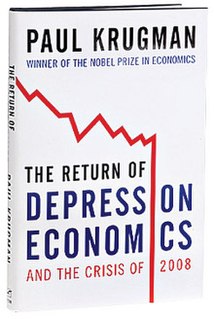
The Return of Depression Economics and the Crisis of 2008 is a non-fiction book by American economist and winner of the Nobel Prize in economics Paul Krugman. The 2008 book is an updated version of his 1999 work, The Return of Depression Economics and draws parallels between the 2008 financial crisis and the Great Depression. Krugman writes a twice-weekly op-ed column for The New York Times and a blog named for his 2007 book The Conscience of a Liberal and teaches economics at Princeton University.

















